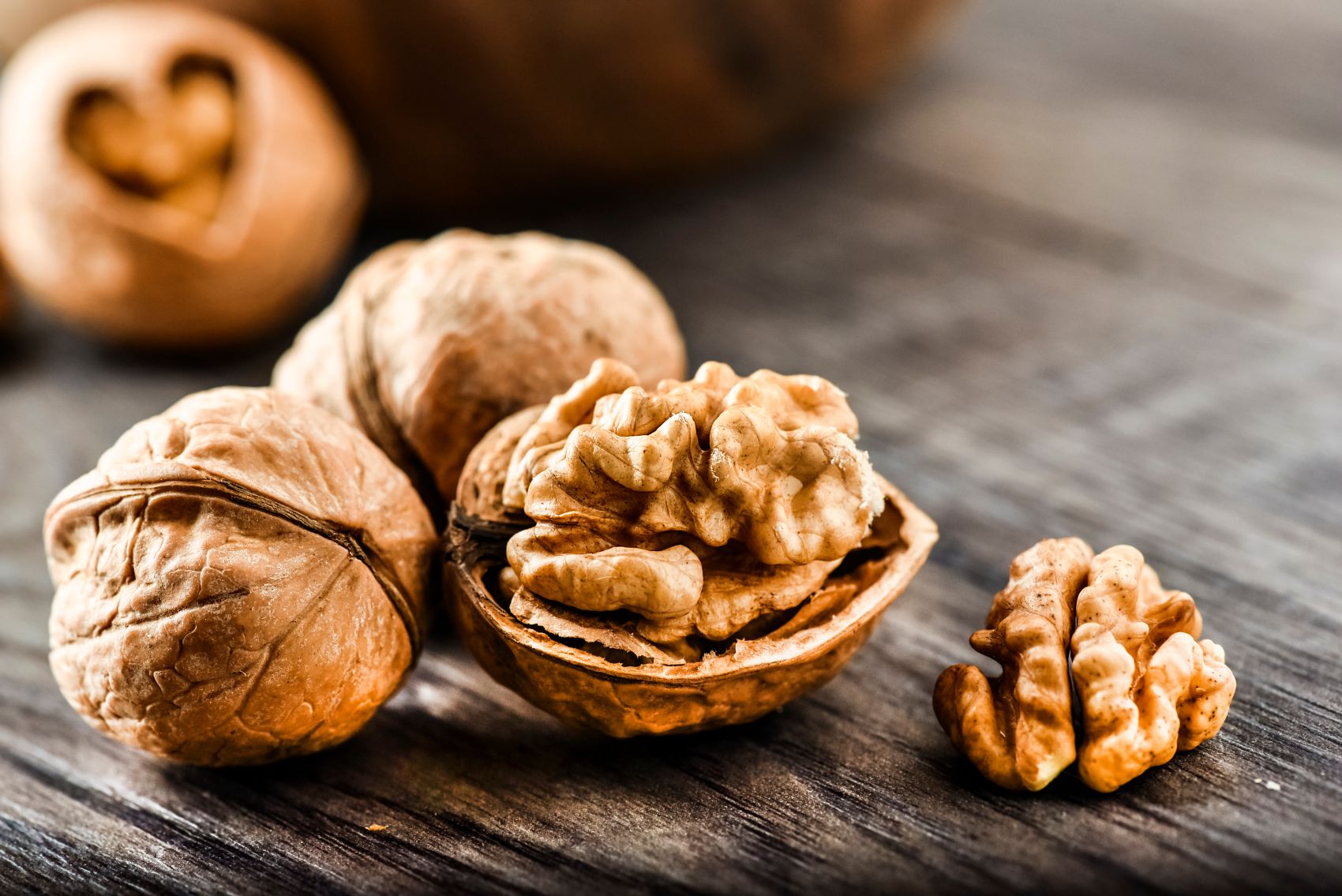Why eat walnuts?

Nuts are a group of foods with an exceptional concentration of nutrients. We know them mainly as a source of healthy fats, but that's not the end of their benefits. A distinctive feature of walnuts is their shape, which resembles... a brain! It turns out that this association is quite accurate, because among the numerous properties of walnuts is the promotion of brain health. Walnuts are an integral part of the Mediterranean diet, which is a great calling card for them.
Walnuts - a unique wealth of ingredients
Walnuts(Juglans regia L.) are a great source of unsaturated fatty acids, but not only. 100 g of walnuts contain:
- 15.2 g protein,
- 65.2 g of fat,
- 6.7 g of dietary fiber.
While most nuts are rich in monounsaturated fatty acids, walnuts consist mainly of polyunsaturated fat ty acids (47.2 g). This is mainly α-linolenic acid (omega-3; 9.1 g) and linoleic acid (omega-6; 38.1 g).
There is a lot of vitamin E, sterols and numerous polyphenols, mainly ellagitannins, in walnuts. Ellagitannins are hydrolyzed in the body to release ellagic acid, which is then converted by intestinal bacteria to urolithin A and B, and then to further metabolites. Ellagitannins are well-known anti-inflammatory and antioxidant substances.
In terms of polyphenol content, walnuts not only outclass other foods, but also leave other types of nuts behind. They have more polyphenols than almonds, hazelnuts, pistachios and peanuts. To be precise, the total polyphenols range from 1576 mg to 2499 mg per 100 g of walnuts. This is an impressive result.
Other significant components of walnuts are selenium, folate, magnesium and phosphorus, melatonin,
Health properties of walnuts
The most important aspects of the properties of these nuts are:
- support for the cardiovascular system, improvement of lipidogram;
- control of inflammation and oxidative stress;
- appetite control;
- protection of the brain from degeneration;
- protection of the psyche against deterioration of mood
Walnuts, and the cardiovascular system
Regular consumption of total nuts has been linked to supporting the cardiovascular system. Likewise with providing adequate amounts of unsaturated fatty acids, including a minimum of 10 grams of linoleic acid. Walnuts are no exception, but it's worth mentioning that studies have confirmed this effect specifically for this type of nut. We know this from a meta-analysis of 13 studies in which participants included walnuts in their diet for a period of 4 to 24 weeks, with the nuts themselves accounting for between 10 and 24% of the caloric content of their diet. The results showed a marked improvement in lipidogram, mainly through lowering LDL cholesterol. Additional observations included improved antioxidant capacity and an improved profile of inflammatory markers.
Walnuts, and the brain
The benefits to the brain are mainly due to the control of inflammation and oxidative stress in neurons. Studies with walnut extracts have shown the property of inhibiting Aβ aggregation, which would be expected to reduce the risk of developing Alzheimer's disease. There is also a lot of talk about reducing the risk of senile dementia overall, keeping the mind functional for longer.
Researchers note that regular consumption of nuts reduces the risk of depressive symptoms, but walnuts were particularly effective in this area. People on a diet enriched with walnuts showed more interest in doing things, had better concentration, higher energy levels and fewer feelings of hopelessness.

Walnuts, and satiety and body shape
In a study in which a significant portion of dietary calories were provided from walnuts, there was concern about an increase in BMI. As it turned out, BMI not only did not increase, but gained a slight downward trend. How does this happen if nuts are so fatty? It's mainly about the sizable fiber content and the fact that nuts in general are heavily satiating. Despite providing a fair amount of kcal from nuts alone, the overall caloric intake per day does not increase, and because these nuts are simply healthy, metabolic parameters that affect body composition can improve.
Walnuts as part of general prevention
This is supported by the very high efficiency of antioxidant and anti-inflammatory activity. After all, most of the diseases of civilization have an inflammatory basis, so a constant supply with the diet of compounds that help control inflammation is a very important matter. Controlling oxidative stress is also a critical part of preventive health care, as excess free radicals can do severe damage to the body. Healthy fats, vitamins, minerals and an unusually high amount of polyphenols all sound like a great health protection package.
Summary
Nuts and seeds are foods worth eating regularly in small amounts. They are incredibly healthy and very nutrient-dense, and their health benefits are well documented. This is true not only for walnuts - they are worth eating, but the most benefit can come from alternating several types of nuts to make your diet more diverse, both in terms of composition and taste.
Interestingly, many of the studies with walnuts are conducted on seniors. It appears that for this population group, walnuts may be particularly beneficial, due to their extremely friendly composition and form - it's more pleasant to crunch nuts than to ingest pills. The inhibitory effect on inflammation in the brain is also a promising mechanism for reducing (or delaying) the risk of senile dementia.
Sources:
- Chauhan A, Chauhan V. Beneficial Effects of Walnuts on Cognition and Brain Health. Nutrients. 2020 Feb 20;12(2):550. doi: 10.3390/nu12020550. PMID: 32093220; PMCID: PMC7071526.
- Sánchez-González C, Ciudad CJ, Noé V, Izquierdo-Pulido M. Health benefits of walnut polyphenols: An exploration beyond their lipid profile. Crit Rev Food Sci Nutr. 2017 Nov 2;57(16):3373-3383. doi: 10.1080/10408398.2015.1126218. PMID: 26713565.
- Banel DK, Hu FB. Effects of walnut consumption on blood lipids and other cardiovascular risk factors: a meta-analysis and systematic review. Am J Clin Nutr. 2009 Jul;90(1):56-63. doi: 10.3945/ajcn.2009.27457. epub 2009 May 20. PMID: 19458020; PMCID: PMC2696995.



 ⮜ Previous article
⮜ Previous article
PQQ - what is it and what properties does it have?
 Next article ⮞
Next article ⮞